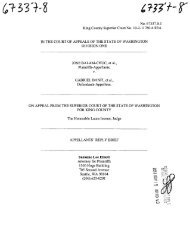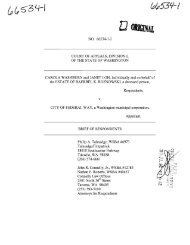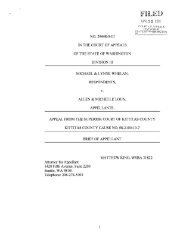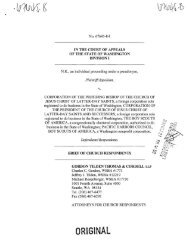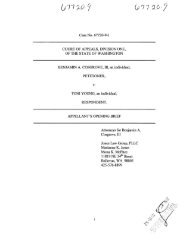Appellants' Reply Brief - Washington State Courts
Appellants' Reply Brief - Washington State Courts
Appellants' Reply Brief - Washington State Courts
Create successful ePaper yourself
Turn your PDF publications into a flip-book with our unique Google optimized e-Paper software.
opening brief (AB at 10-1 1) from the Board's Decision and Order where<br />
the Board explained that, while some of these expenditures "may have<br />
been controllable by Ms. Malang to different degrees," each had a<br />
corresponding "impact . . . on . . . gross receipts." CABR at 6.<br />
Malang responds with an argument that the Board rejected in her<br />
case. She claims that no deduction from gross income should be taken for<br />
business expenses that are controllable or discretionary by the business<br />
operator. RB at 34-36 (asserting in RB at 35 that her only necessary<br />
expense was her business license). Malang's argument is unsupportable in<br />
law or common sense.4 A convenience store operator has broad discretion<br />
as to what items to carry, whether to advertise, what kind of signage to<br />
use, how to furnish the store, and a vast array of other things. A farmer<br />
has discretion as to what to cultivate, who to buy product from, what<br />
equipment to use, whether to do repairs himself, and a vast array of other<br />
things. But if a convenience store operator or farmer elects industrial<br />
insurance coverage, the wage-equivalent under RCW 5 1.08.178(4) for the<br />
convenience store operator or farmer should not turn on whether the<br />
4 Malang cites a Board non-significant decision in In re Kenneth Paige, BIIA<br />
Dckt. Nos. 93 2534-36, 93-2547-49, 93-2633-35 (March 7, 1994) where the Board's<br />
findings of fact, with no accompanying analysis, appear to suggest that the Board<br />
excluded certain discretionary business expenditures in computing "wages" for purposes<br />
of determining temporary partial disability benefits under RCW 5 1.32.090(3). It is<br />
difficult, if not impossible, to determine the Board's reasoning in Steele, but if the<br />
discretionary nature of business expenses was the basis for the Board's findings in Steele,<br />
the Board was wrong there, and the Board's reasoned analysis in the instant case should<br />
be adopted here.



